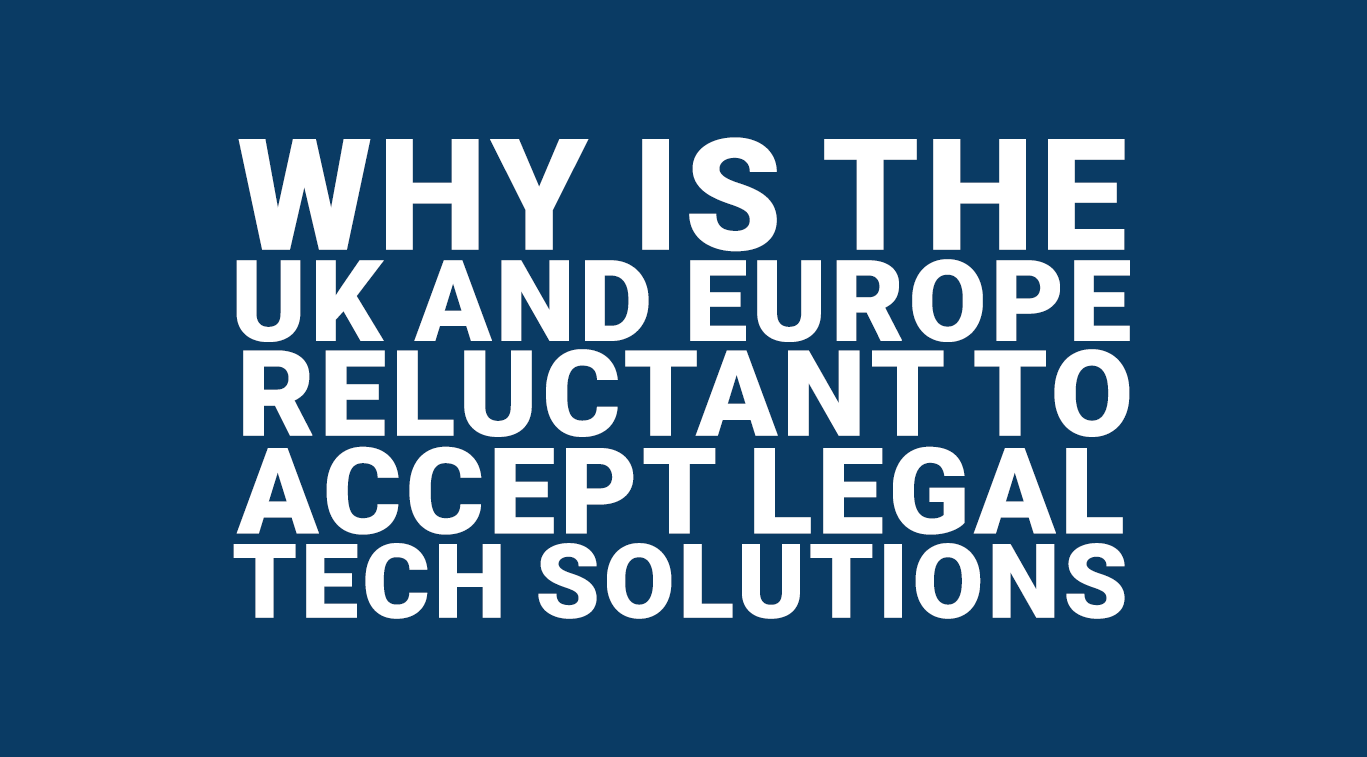Why are the UK and Europe reluctant to accept Legal Tech solutions?

Written by Shrisha Sapkota
Blogger

Technology has changed the face of everything, and the law is no exception. Law firms worldwide are employing digital strategists and embracing the benefits of legal tech.[1] Before we dive into the legal technology solutions, it’s important to understand what this technology is.[2] Legal technology, also known as Legal Tech, refers to the use of technology and legal software tools to provide legal services and support the legal industry. Legal Tech companies are often startups founded to disrupt the traditionally conservative legal market.[3] Historically, the term legal technology has been used to refer to the software used by law firms for practice management, accounting, billing, and document storage and retrieval.[4]
Over the decade, the legal software industry has changed dramatically, from one controlled by a handful of dominant legacy companies to one driven by a surge of creative and feisty startups whose products are changing how the law is practised and legal services delivered.[5] In the last few years, the legal industry has seen immense change and emerging areas such as legal technology and legal cases have seen unprecedented growth.[6] Legal Tech companies are often startups founded to disrupt the traditionally conservative legal market.[7] Legal technology software enables the development of new business and delivery models, and they provide enough incentives to clients and knowledge to lawyers, for the adoption of alternative legal services.[8]
From the first day of law school, lawyers-to-be are encouraged to embrace stare decisis, the principle that precedent shapes legal arguments. Given this mindset, it comes as no surprise that professionals trained to respect what came before often have trouble adopting new things, like technology.[9] Implementing legal tech software can be a large undertaking – and many firms have been burned after spending huge amounts of money, time and resource on introducing a new software bundle, only to be left feeling underwhelmed.[10] The real reason behind the lag in the adoption of technology by the law and by lawyers – the old ways work just fine, for most purposes. And the risk of something going wrong (paper files don’t disappear in a hard drive crash, for example) often simply outweighs the interest in trying something new.[11] In an industry where each six-minute increment has a dollar figure attached to it, speed counts, some law firms don’t want to invest in technology because they think it’s going to create lag time.[12]
In the past decade, legal tech was widely regarded as fintech’s ugly sibling, but it is now a lucrative investment domain of its own.[13] More and more law firms are looking towards practice management software for law firms to help them become more efficient as well as to uphold the new remote/hybrid workplaces that many firms have moved into.[14] According to Thomson Reuters analysis, since 2017, there has been a 484% increase in the number of legal technology patents worldwide. Many law companies experience a vast increase in leads due to the implementation of LegalTech solutions.[15] The UK tech sector is booming. New figures released by the government’s Digital Economy Council show that the industry grew by 1000% between 2010 and 2020.[16] The UK’s technology industry is worth $1 trillion after a surge of growth throughout the pandemic. Dealroom figures suggest the tech sector doubled in value in 2020 to $942 billion and continued to see growth in both private and public markets throughout 2021.[17] One key element of tech industry growth has been the increasing availability of venture capital funds, going from £1.2bn in 2010 to £11.3bn last year, higher than France and Germany combined. Growth in venture capital investment has increased by over 40% for the third year in a row.[18] In 2019, the European B2B legal tech market generated revenues of 4.03 billion U.S. dollars, whilst the B2C market generated 330 million U.S. dollars in revenue.[19]
According to the data from the 2018 Sharplegal Report released by Acritas, American legal departments are more likely to use new legal technologies. The report further outlines that 25% of UK legal departments are not using any technology, as compared to 11% in the US. Further, new research from Dell Technologies has also discovered that businesses in the UK are generally trailing behind 12 other global countries.[20] According to the data from Statista, the LegalTech market generated revenues of 17.32 billion U.S. dollars worldwide in 2019. The compound annual growth rate (CAGR) is expected to grow over 6% from 2021 to 2025. By 2025, revenues will reach 25.17 billion U.S. dollars.[21] Among legal technology trends in Europe, we find smaller, specialist law firms are taking on entrepreneurial projects that are challenging larger firms to keep up. By thinking out of the box, these small firms are changing the traditional way of doing things and introducing new ideas that may well pave the way for the future.[22] Legal tech can help firms achieve quality results by applying digital technologies to improve their essential services and remain top of their game. They give the firms a better advantage and also share their client’s satisfaction.[23]
Covid-19 forced businesses and social interactions to rely on technology because of social distancing rules exacerbated by fear. The legal industry, being no exception, was forced to embrace technology, shedding unnecessary rituals and processes.[24] The legal sector, which had been reluctant to large-scale digital adoption for years, has changed a lot after the impact of the COVID-19 outbreak in 2020. Law firms and corporate legal departments had no other choice than to adapt to the remote working strategies trending across the globe.[25] The pandemic catalyzed remote work, video calls, digital documents, automated workflows, e-filings and more. This phenomenon forced legal leaders to cut costs, trim the workforce and invest in automation.[26] With the pandemic hike, the urge to adopt technological solutions became crucial for law firms and lawyers to continue their work. Many lawyers have now trusted the new tools for law to run their law practice. Now they can operate from anywhere anytime without stressing about physical offices setup.[27] The best law firms transitioned seamlessly during the pandemic with the available legal technology, like software programs for case filing that allow team members to access and work on them remotely.[28]
The recently released 2021 Wolters Kluwer Future Ready Lawyer report showcases these changes – technology-driven firms and departments weathered the pandemic a lot better than laggards, increasing their profitability to 47% — compared to 28% in the prior year.[29] Data from the SRA shows that the number of regulated firms fell by 1.9% between December 2019 and December 2020 (from 10,278 to 10,080) with 426 new law firms opening and 539 closings. Legal Aid firms have struggled the most with over 70 closing since April 2020.[30]
To avoid falling behind, it is vital to react to technological disruptions appropriately and to implement more considerable resources for the overall application and education of legal tech.[31] By eliminating the tedious grunt work, technology will be able to free lawyers from the chains of mundane work and allow them to do the tasks they find more enjoyable.[32] Apart from the legal industry-related skills as a lawyer, such as in-depth knowledge about clients, the law, and other subjects, communication skills, problem solving and analytical skills, and tech skills are crucial for survival.[33]
References
[1] https://www.casedo.com/insights/legal-technology/legal-tech-on-the-rise-is-the-uk-falling-behind/
[2] https://www.natlawreview.com/article/7-legal-technology-trends-successful-2022
[3] https://en.wikipedia.org/wiki/Legal_technology
[4] https://itchronicles.com/legal-technology/
[5] https://ccbjournal.com/articles/the-decade-in-legal-techthe-10-most-significant-developments
[6]https://www.lawyersweekly.com.au/newlaw/27113-what-the-past-5-years-of-legal-tech-means-for-the-next-20
[7] https://en.wikipedia.org/wiki/Legal_technology
[8]https://mdpi-res.com/d_attachment/sustainability/sustainability-11-01015/article_deploy/sustainability-11-01015.pdf
[9] https://legal.thomsonreuters.com/blog/3-reasons-why-law-firms-are-resistant-to-technology/
[10] https://www.linkedin.com/pulse/why-lawyers-so-damn-afraid-legal-tech-olivia-wensley
[11] https://www.quora.com/Why-might-some-lawyers-dislike-technology
[12] In an industry where each six-minute increment has a dollar figure attached to it, speed counts. Some law firms don’t want to invest in technology because they think it’s going to create lag time.
[13]https://www.forbes.com/sites/forbestechcouncil/2021/09/23/legal-tech-new-paradigms-for-the-new-decade/?sh=4166db6d593c
[14] https://www.legalsupportworld.com/blog/firms-more-prepared-to-use-legal-tech/
[15] https://hackernoon.com/legal-tech-solutions-market-size-impact-and-trends
[16]https://www.caminosearch.co.uk/blog/2021/07/4-reasons-why-the-uk-tech-industry-is-thriving?source=google.com
[17] https://www.itpro.co.uk/business-strategy/startups/367235/uk-tech-sector-reaches-1-trillion-valuation
[18]https://www.caminosearch.co.uk/blog/2021/07/4-reasons-why-the-uk-tech-industry-is-thriving?source=google.com
[19] https://www.statista.com/statistics/1155911/europe-legal-tech-revenue-by-market/
[20] https://www.casedo.com/insights/legal-technology/legal-tech-on-the-rise-is-the-uk-falling-behind/
[21] https://hackernoon.com/legal-tech-solutions-market-size-impact-and-trends
[22]https://mitratech.com/resource-hub/blog/emerging-legal-technology-trends-in-europe-africa-and-the-middle-east/
[23] https://www.legalsupportworld.com/blog/firms-more-prepared-to-use-legal-tech/
[24] https://www.entrepreneur.com/article/421514
[25] https://www.legalsupportworld.com/blog/firms-more-prepared-to-use-legal-tech/
[26]https://www.forbes.com/sites/forbestechcouncil/2021/09/23/legal-tech-new-paradigms-for-the-new-decade/?sh=4166db6d593c
[27] https://www.quora.com/Why-might-some-lawyers-dislike-technology
[28] https://www.legalsupportworld.com/blog/firms-more-prepared-to-use-legal-tech/
[29]https://www.forbes.com/sites/forbestechcouncil/2021/09/23/legal-tech-new-paradigms-for-the-new-decade/?sh=4166db6d593c
[30] https://www.armstrongwatson.co.uk/services/covid-19-and-your-business/impact-covid-19-legal-sector
[31] https://www.casedo.com/insights/legal-technology/legal-tech-on-the-rise-is-the-uk-falling-behind/
[32] https://www.linkedin.com/pulse/why-lawyers-so-damn-afraid-legal-tech-olivia-wensley
[33]https://timesofindia.indiatimes.com/blogs/voices/the-pandemics-impact-on-the-legal-sector-and-what-emerging-lawyers-need-to-know/








